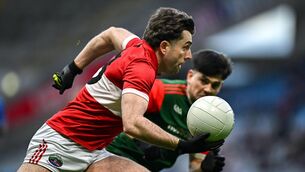O'Neill: GAA should not dwell on 'recessionary doom and gloom'
Former GAA Presidential candidate Liam O'Neill has called upon GAA authorities to not dwell on the doom and gloom of the current economic recession but rather use it as an opportunity to build for the future.
In his address to delegates at the Leinster GAA Convention in Kinnegad, County Westmeath, O'Neill urged those in attendance to ensure the GAA has itself well primed for when the Irish economy starts moving in the right direction once again.
"There is an air of despondency over the country at the moment which disturbs me and which must not be allowed to influence unduly what we wish to achieve as an association," he said.
"We are a strong vibrant organisation and I think we can give a lead to others by how we handle ourselves during these challenging times.
"Rather than cut back in our activities we should seek to use this time of recession to build for the future, so that when the country gets back on its feet it will find us in prime position to lead the youth of our nation in sporting activity."
O'Neill is supportive of the GAA's strategy plans both provincially and nationally, which he believes will place the GAA in a key position in the coming years.
However, he also accedes that plans are of no benefit to the association if they are not acted upon.
"I welcome our 'Strategic Vision for the Future'. I hope it is acted on more quickly than previous plans," he said.
"In summer 2007 we announced that we intended to spend significant sums on development of playing facilities. I know that while some progress has been made in spending some of this money I feel that there is much more we could be doing."
O'Neill called upon county boards and other GAA bodies to become more actively involved with local Government bodies and agencies in a bid to strengthen funding for infrastructural and other projects.
"A recession should mean that we can get work done cheaper than we could have done in the last few years.
"We should seek to engage with local authorities and Government agencies much more aggressively than we have to date and we should be prepared to borrow for infrastructural projects on a large scale, bearing in mind our capacity to repay loans.
"Local authorities own land and we have the finance and resources to develop sporting facilities. It should be easy to do business with them with a bit of flexibility on both sides.
"Decision making on these types of projects would need to be done centrally with a view to proceeding first with those projects which will yield the quickest returns and in time we should be able to get around to all counties. Regional needs must supercede local or county needs."
O'Neill also believes that while growing number of paid employees in the GAA at present is certainly welcomed, the organisation must not forget the bedrock by which the association has built itself in the valued contribution of its strong volunteer base.
"We have huge number of full-time employees working for the association at the moment and we have been in the main very well served by those we have chosen.
"Getting the balance right between the involvement of paid employees and the input of volunteers is a challenge faced by all sporting organisations.
He added: "I have always said that it is the role of democratically elected people to make policy and it is the role of our employees to implement those policies. Where those lines become blurred there is potential for conflict.
"The area of coaching and games development has been the main area for employment up to now but soon over half of our counties will have the services of a full-time county secretary. One day all counties will have a paid secretary."
And O'Neill also has concerns about the proliferation of full-time officers at the expense of the volunteer with a shift towards decision-making during working hours and not at night when volunteers are freely available to engage in GAA activities.
"I welcome this but I do have a concern. In an ideal world the employment of full-time people should lessen the work of volunteers.
"What seems to me to be happening, however, is that as we employ more and more people, meetings which one time were held at night are now increasingly being held during the working day when volunteers are at work.
"This means that volunteer members of some committees will either have to be retired from work or in a position to take time off work.
"This is not an ideal situation. It appears to me that as more and more meetings of our paid employees are held, more and more work is being generated and subsequently being hived off to volunteers.
"At the same time we are bemoaning the lack of volunteers in some areas. We need to get this balance right.
"The solution is to train and upskill our volunteers in best administrative practice and then plan our activities to make best use of the talents and available time of our volunteers."













